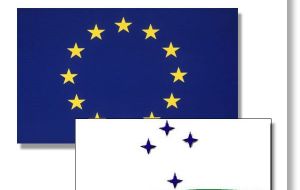MercoPress. South Atlantic News Agency
EU and Mercosur will propose WTO an accord to end agriculture export subsidies
 The European Union, Brazil together with Argentina, Uruguay, Paraguay, and New Zealand will be making the presentation in Nairobi next December
The European Union, Brazil together with Argentina, Uruguay, Paraguay, and New Zealand will be making the presentation in Nairobi next December The European Union and Brazil representing Mercosur (Argentina, Brazil, Paraguay and Uruguay), are proposing the World Trade Organization agree to end agricultural export subsidies at a meeting next month. The proposal backers also include New Zealand.
The December ministerial meeting in Nairobi is at risk of having little to offer in terms of major trade agreements, but anyhow hope the WTO’s 161 members will see it as a chance to chalk up a negotiating victory.
That in turn might help the stuttering momentum of global trade talks, which has prompted the United States and other countries to press ahead with regional deals such as the Trans-Pacific Partnership.
The proposal was circulated to WTO members on Monday and will be presented by Brazil and the EU at a WTO meeting on Wednesday, a South American diplomat said.
“It’s a historic move for this organization because, 30 years ago, we decided to ban export subsidies for industrial products, and 30 years later, we are going to do the same for agriculture.”
The proposal revives a previous plan that was rejected at the end of 2008, while aiming to overcome US objections that were the main stumbling block at the time, the diplomat said.
But, other potential opponents could be India, which uses export subsidies for sugar, and Switzerland, which gives subsidies under its chocolate law. Others may feel it doesn’t go far enough.
The proposal would ban subsidies within 11 years and introduce new rules and transparency requirements for state trading enterprises, non-emergency food aid, and export credits, guarantees, and insurance.
The 11-year transition period is composed of three years for developed countries, an additional three years for developing countries, and a further five years for subsidies related to transport and marketing of crops. The 2008 draft had an initial five-year period for developed countries, making 13 years in total.
“Had [the 2008 proposal] gone through, the developed countries would already have banned export subsidies,” the diplomat said.
Export credit repayment periods would be limited to six months, as in the 2008 version, but conditionally extended to nine months.
The United States had objected to changes to export credit rules because of the need to change US law, but the new proposal exploits the terms of a 2014 out-of-court settlement in a dispute between the United States and Brazil over cotton.
“They could multilateralize that... you don’t need to change the law. That was precisely why we thought this was a fairly astute way in which you could get a compromise,” the diplomat said.




Top Comments
Disclaimer & comment rules-

-

Read all commentsI see a light at the end of the tunnel ...
Nov 21st, 2015 - 12:27 pm 0https://www.youtube.com/watch?v=N_7Iua3W1v0
@1. It's the phosphorescence from the faeces and the rotting murdered bodies in Brazil.
Nov 21st, 2015 - 04:07 pm 0Commenting for this story is now closed.
If you have a Facebook account, become a fan and comment on our Facebook Page!